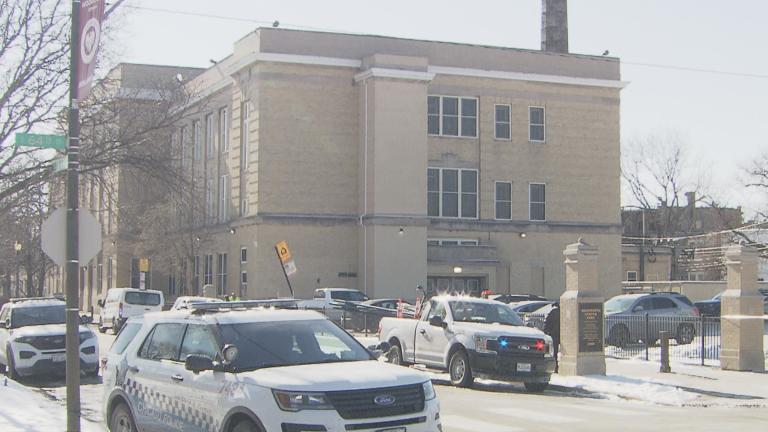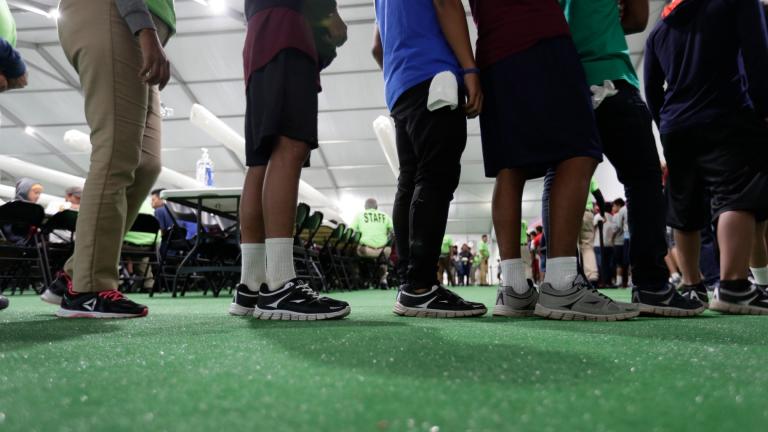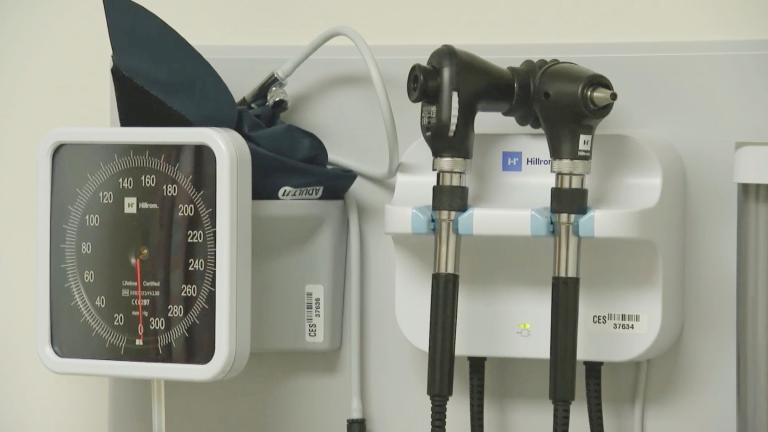Mayor Lori Lightfoot declared a state of emergency in Chicago on Tuesday, as the city’s shelters remain at capacity and officials said the humanitarian crisis gripping the city amid a surge of migrants from Texas had accelerated.
Approximately 450 men, women and children are living on floors in Chicago police stations across the city as of Tuesday, officials said.
“What I have personally seen in the 19th Police District, I wouldn’t allow a dog to be treated that way,” Ald. James Cappleman (46th Ward) said.
While Lightfoot’s declaration of an emergency does not open up additional funding to help care for the immigrants — it does, however, expand the authority of city officials to spend already appropriated funds without City Council approval.
“We shouldn’t have to come to this point, but here we are,” Lightfoot said. “Even in my final days as mayor it is important that we step up and respond to this burgeoning crisis.”
Lightfoot will leave office in less than six days, ensuring that Mayor-elect Brandon Johnson will become Chicago’s 57th mayor during a crisis that has exacerbated tensions between Black and Latino residents and stretched the city’s social safety net past the breaking point.
City officials are scrambling to open additional shelters and respite centers, but have identified few locations equipped to house at least 100 people – and plans to create a shelter at the vacant South Shore High School touched off a political firestorm.
“It is just a bad situation,” said Brandie Knazze, the commissioner of the Department of Family and Support Services. “People should not be sleeping in police stations.”
City officials opened a respite shelter for 125 people at Brands Park in Avondale on Monday, and it is already full, even though the immigrants have only been provided with chairs – not beds, Knazze said.
Ald. Mike Rodriguez (22nd Ward) participated in the virtual meeting while touring a potential location for a respite center in his ward, which includes Little Village.
“We need to step up as a city during this humanitarian crisis,” Rodriguez said. “We have an opportunity to do the right thing.”
The City Council’s Budget and Government Operations Committee endorsed a proposal Tuesday from the mayor to spend $51 million from the city’s 2021 budget surplus to help care for the migrants, and move them out of police stations.
Alds. Nicholas Sposato (38th Ward); Ald. Anthony Napolitano (41st Ward); and David Moore (17th Ward) voted against the proposal. All three will start new terms on the City Council on Monday.
Sposato asked officials what they were doing to take care of elderly Chicagoans and unhoused veterans. The city’s existing shelter system of approximately 3,000 beds is also full, Knazze said.
A final vote on the proposal is scheduled for May 24, which will be the first City Council meeting after Johnson replaces Lightfoot.
However, those funds will only be enough to care for the people who have already arrived in Chicago for just another six weeks, Budget Director Susie Park said.
That likely means the City Council will again be asked to spend more money to care for the migrants in less than three months.
“I don’t know how sustainable this is,” Ald. Jason Ervin (28th Ward) said.
In all, city officials expect to spend $112 million to care for migrants through the end of June. Despite pleading for help from state and federal officials, the city has received just $30 million from the state and $4.3 million from the federal government since Jan. 1. The city received just $5.5 million from the Federal Emergency Management Agency to care for immigrants who arrived in 2022.
More than 8,100 people, most of them from Central and South America, have arrived in Chicago since Aug. 31, when Republican Texas Gov. Greg Abbott sent the first bus of migrants to Chicago, officials said. Approximately 3,000 migrants, who are in the country legally after requesting asylum and being granted parole, are being housed in the city’s shelters, officials said.
Lightfoot issued the emergency declaration after Abbott sent a bus of 48 migrants to Chicago, the first in many months. Since mid-April, more than 100 people have arrived in Chicago via plane, on tickets paid for by nonprofit groups assisting people at the nation’s southern border, officials said.
City officials expect the bus to be the first of many, exacerbating a crisis that has already reached the boiling point.
The current surge of migrants began arriving in mid-April, catching city officials off guard who were relieved that the crisis appeared to have eased after peaking in the fall.
City officials were focused on preparing for a new wave of people to make their way to Chicago after federal officials stop enforcing a public health rule designed to limit the spread of disease by expelling asylum-seekers on the southern border on Thursday.
“We’re going to get hit like we did in the fall,” Knazze said Tuesday.
Contact Heather Cherone: @HeatherCherone | (773) 569-1863 | [email protected]








